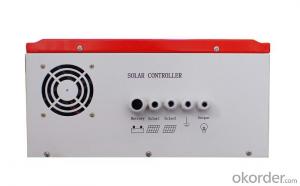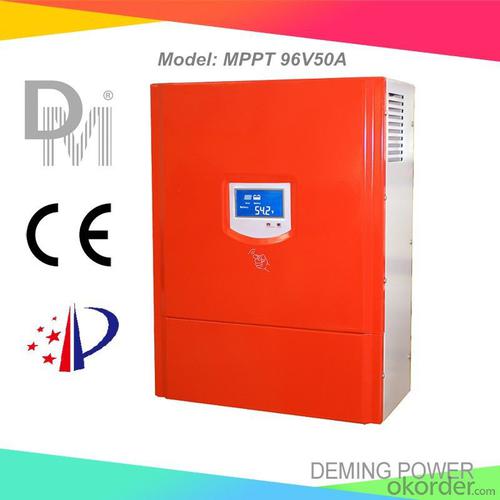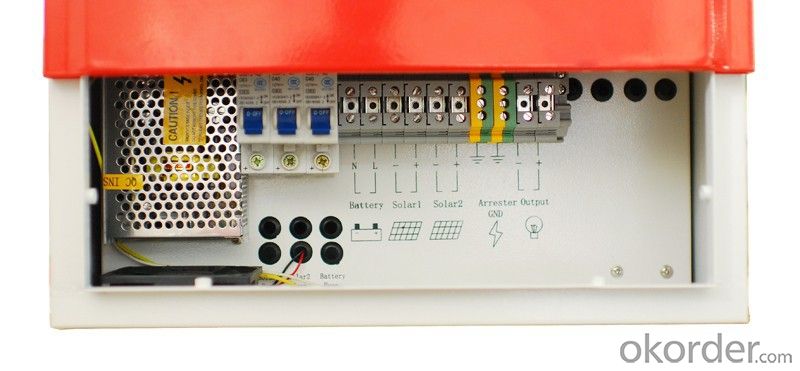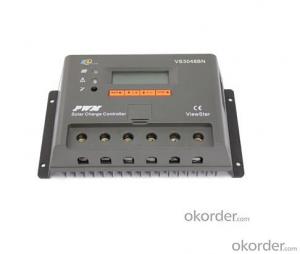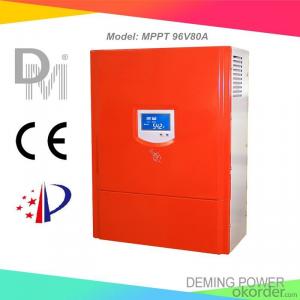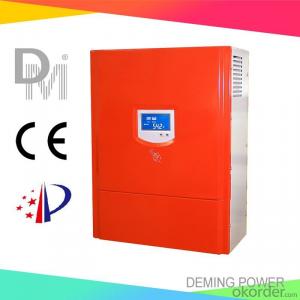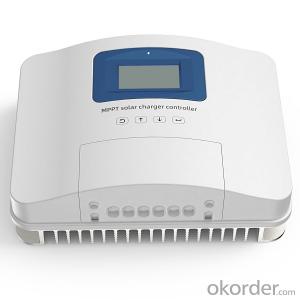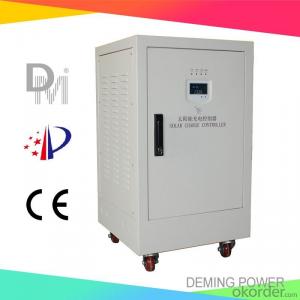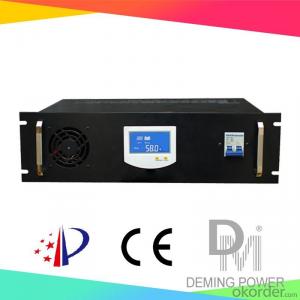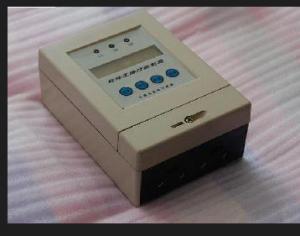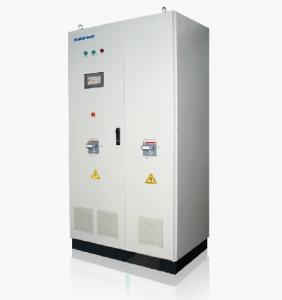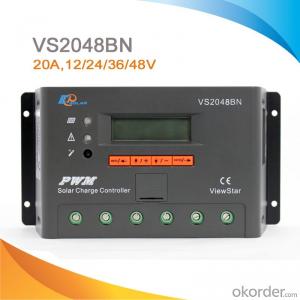Genasun Mppt Solar Charge Controller 96V 50A for Solar Power System
- Loading Port:
- Qingdao
- Payment Terms:
- TT or LC
- Min Order Qty:
- 1 PCS
- Supply Capability:
- 1000 PCS/month
OKorder Service Pledge
OKorder Financial Service
You Might Also Like
Properties of the solar charge controller
1. Design for off-grid solar power system.
2. Applicable to different kinds of batteries.
3. Adopts MPPT technology (Maximum Power Point Tracking). The advanced tracking algorithm make the solar module operate at ideal voltage which the solar modules can produce the maximum available power.
4. Modular design with simple structure and easy maintenance.
5. Automatic power control function.
Technical parameters of the solar charge controller
Model | 96V50A | |||||
Battery group rated voltage | 96Vdc | |||||
PV Rated current | 50A | |||||
PV open circuit voltage | 400V | |||||
PV Max. power | 4800Wp | |||||
Input PV module road number | 1 | |||||
Function | MPPT charge mode, auto stop charge, auto recharge voltage; Protection: connecting contrary, over current, short circuit, over heat etc. | |||||
Display mode | LCD | |||||
Display content | solar panel voltage, solar panel current, solar panel power, battery voltage, charge current | |||||
MPPT DC voltage range | 80-116Vdc | |||||
Floating Charge Voltage (adjustable) | 110Vdc | |||||
Stop charge voltage | 116Vdc±1% | |||||
Recharge voltage | 108V±1% | |||||
Voltage drop between PV and battery | 1.5V | |||||
Max itself power consumption | 100mA-150mA | |||||
Work environment temperature | -30-60°C | |||||
Relative humidity | 90% No condensation | |||||
Applicable altitude | 3000m The rated power should be reduced when it is higher than 2000m | |||||
Noise (1m) | 40dB | |||||
Degree of protection | IP20(Indoor) | |||||
Cooling method | Forced air cooling | |||||
*Communication interface (optional) | RS485/USB/GPRS/Ethernet | |||||
*Temperature compensation(optional) | -4mv/°C/2V,-35°C~+80°C,Accuracy:±1°C | |||||
Product size (mm) | 480*370*160mm | |||||
Product Weight(kg) | 12kg | |||||
*Above parameter only for reference. Could be custom made to user specifications.
Image
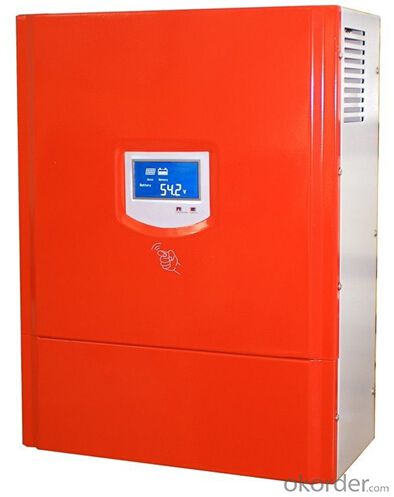
FAQ
Q1:Can we visit your factory?
A1:Sure,welcome at any time,seeing is believing.
Q2:Which payment terms can you accept?
A2:T/T,L/C,Moneygram,Paypal are available for us.
- Q: Can a solar controller be used with a 24V battery system?
- Yes, a solar controller can be used with a 24V battery system. Solar controllers are designed to regulate the charging process of solar panels and manage the flow of electricity to the battery system. They are compatible with various battery voltages, including 24V, and can effectively monitor and control the charging process in such systems.
- Q: How do you prevent reverse current flow with a solar controller?
- A solar controller prevents reverse current flow by utilizing a diode in its circuitry. This diode allows current to flow from the solar panels to the battery, but blocks the flow of current in the opposite direction, thus preventing reverse current flow.
- Q: How does a solar controller handle temperature fluctuations?
- A solar controller handles temperature fluctuations by continuously monitoring the temperature and adjusting the charging parameters accordingly. It regulates the flow of power from the solar panels to the batteries, ensuring that the batteries are charged optimally and preventing damage due to overcharging or undercharging. Additionally, advanced solar controllers may feature temperature compensation, where they adjust the charging voltage based on the ambient temperature to maximize the efficiency and lifespan of the batteries.
- Q: Can a solar controller be used with a solar-powered trash compactor?
- Yes, a solar controller can be used with a solar-powered trash compactor. A solar controller regulates the amount of power being supplied to a device, ensuring the optimal charging and functioning of the compactor's solar panels. It helps maximize energy efficiency and protect the compactor's battery from overcharging or excessive discharge.
- Q: Can a solar controller be used with a solar-powered electric scooter charging station?
- A solar-powered electric scooter charging station can utilize a solar controller. This device, also referred to as a charge controller, is specifically designed to regulate the charging process of a solar panel system. Its primary function is to prevent battery overcharging and ensure optimal charging efficiency. When applied to a solar-powered electric scooter charging station, a solar controller effectively manages the energy flow from the solar panels to the batteries that store the energy. By doing so, it helps maintain the battery's health and prolongs its lifespan. Moreover, a solar controller offers valuable data and monitoring capabilities, enabling better management and optimization of the charging station's performance. Therefore, it is highly recommended to incorporate a solar controller into a solar-powered electric scooter charging station to guarantee efficient and dependable operation.
- Q: How does a solar controller handle power fluctuations from the solar panels?
- A solar controller, also known as a charge controller, is a crucial component in a solar power system that manages the power fluctuations from the solar panels. Its primary function is to regulate and control the charging process of the batteries and prevent them from overcharging or undercharging. When it comes to power fluctuations from the solar panels, the solar controller employs various techniques to handle them effectively. One of the primary methods is the use of maximum power point tracking (MPPT) technology. MPPT allows the solar controller to constantly monitor the voltage and current output of the solar panels and adjust the charging parameters accordingly. During power fluctuations, the solar controller continuously tracks the maximum power point of the solar panels, which is the point at which they generate the most power. By doing so, it ensures that the solar panels are operating at their optimal efficiency, regardless of any fluctuations in sunlight intensity, temperature, or shading. This MPPT feature enables the solar controller to extract the maximum available power from the solar panels and deliver it to the batteries. Furthermore, a solar controller also incorporates various protection mechanisms to handle power fluctuations. It typically includes features like overvoltage protection, low voltage disconnect, and short circuit protection. These safety measures safeguard the solar panels, batteries, and other components of the system from potential damage caused by voltage spikes, sudden drops in voltage, or electrical faults. In addition to MPPT and protective features, some advanced solar controllers also offer advanced algorithms and programming options. These allow the controller to dynamically adjust the charging parameters based on the solar panel's performance, battery condition, and system requirements. This adaptability ensures efficient power management and optimal battery charging, even in the face of power fluctuations. Overall, a solar controller is designed to handle power fluctuations from the solar panels by utilizing MPPT technology, implementing protective measures, and employing advanced algorithms. Its role is to ensure the smooth and efficient operation of the solar power system, maximize power generation, and prolong the lifespan of the batteries.
- Q: Can a solar controller be used with a generator or grid power as a backup?
- Yes, a solar controller can be used with a generator or grid power as a backup. A solar controller regulates the charging and discharging of batteries in a solar power system, and it can seamlessly integrate with a generator or grid power source when additional or backup power is needed.
- Q: How does a solar controller prevent damage from over-discharging of batteries?
- A solar controller prevents damage from over-discharging of batteries by continuously monitoring the battery voltage and automatically disconnecting the load when the voltage drops below a certain threshold. This prevents the batteries from being drained beyond their safe operating range, preserving their lifespan and preventing irreversible damage.
- Q: Can a solar controller be used in a residential solar system?
- Yes, a solar controller can be used in a residential solar system. A solar controller is an essential component that regulates the flow of electricity from the solar panels to the battery bank. It helps protect the batteries from overcharging or undercharging, thus optimizing their lifespan and performance. In a residential solar system, a solar controller ensures efficient energy management and helps maintain a stable and reliable power supply.
- Q: What is the maximum number of parameter settings supported by a solar controller?
- The maximum number of parameter settings supported by a solar controller can vary depending on the specific model and manufacturer. However, it is common for solar controllers to support a range of parameter settings, typically between 10 to 20 settings, allowing for customization and optimization of the solar system.
Send your message to us
Genasun Mppt Solar Charge Controller 96V 50A for Solar Power System
- Loading Port:
- Qingdao
- Payment Terms:
- TT or LC
- Min Order Qty:
- 1 PCS
- Supply Capability:
- 1000 PCS/month
OKorder Service Pledge
OKorder Financial Service
Similar products
Hot products
Hot Searches
Related keywords



